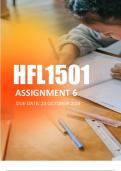Exam (elaborations)
HFL1501 Assignment 6 2024 | Due 26 October 2024
- Institution
- University Of South Africa (Unisa)
QUESTION 1 1.1 Name one South African constitution of which you have learned in this module that embraced an approach of complete denial of the principle of constitutionalism.
[Show more]



